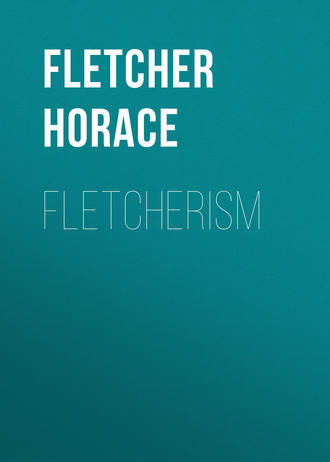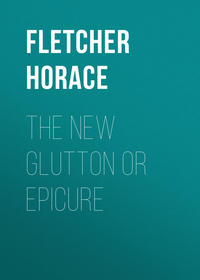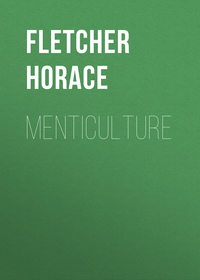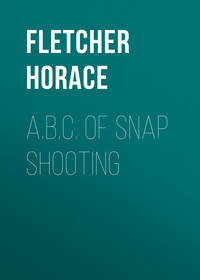 полная версия
полная версияFletcherism
Both of these tests can be tried by any one in the privacy of his or her own bedroom.
Doctor Anderson, Director of the Yale Gymnasium, taking advantage of the cue offered by the Yale experiments, which he superintended, practised Fletcherizing in all its branches. At the end of six years he put the muscles thus purified to the test, with the result that he added fifteen pounds of pure muscle to a frame that never carried more than 135 pounds before in the half century of its existence, and demonstrated that the same progressive recuperation that I have enjoyed is open and available to others who have passed middle life.
Mr. Stapleton, one of Professor Chittenden's volunteers, grasped the same valuable cue while serving as one of the heavy-weight test-subjects in the Yale experiments. He reduced his waist measurement to thirty inches and a half, increased his chest measurement to forty-four inches; and has refined his physique until his ribs show clearly through his flesh, while his muscles mount tall and strong where muscle is needed in the economy of efficiency. In the meantime, without training other than that connected with his teaching, he increased the total of his strength and endurance more than one hundred per cent.; and reduced his amount of food by nearly, if not quite, half – as have also Doctor Anderson and myself.
MY ENDURANCE TEST AT YALEThese are merely typical cases of distinguished and measured improvement.
How the movement went on from step to step others have told, and I need not follow it further here.
Two years after I began my experiments my strength and endurance had increased beyond my wildest expectation. On my fiftieth birthday I rode nearly two hundred miles on my bicycle over French roads, and came home feeling fine. Was I stiff the next day? Not at all, and I rode fifty miles the next morning before breakfast in order to test the effect of my severe stunt.6
When I was fifty-eight years of age, at the Yale University Gymnasium, under the observation of Dr. Anderson, I lifted three hundred pounds dead weight three hundred and fifty times with the muscles of my right leg below the knee. The record of the best athlete then was one hundred and seventy-five lifts, so I doubled the world's record of that style of tests of endurance.
The story of this test at Yale, when I doubled the "record" about which so much has been written, is this: Professor Irving Fisher, of Yale, had devised a new form of endurance-testing machine intended to be used upon the muscles most commonly in use by all persons. Obviously these are the muscles used in walking. Quite a large number of tests had been measured by the Fisher machine, but it was still being studied with a view to possible simplification.
I was asked to try it and to suggest any changes that might improve it. I did so, and handled the weight with such seeming ease that Dr. Anderson asked me whether I would not make a thorough test of my endurance. This I was glad to do.
The Professor Irving Fisher Endurance Testing Machine is weighted to 75 per cent. of the lifting capacity of the subject, ascertained by means of the Kellog Mercurial Dynamometer. The lifting is timed to the beats of a metronome.
When I began, Dr. Anderson cautioned me against attempting too much. I asked him what he considered "too much," and he replied: "For a man of your age, not in training, I should not recommend trying more than fifty lifts." So I began the test, lifting the weight to the beat of the metronome at the rate of about one in two seconds, and had soon reached the fifty mark. "Be careful," repeated Dr. Anderson, "you may not feel that you are overdoing now, but afterwards you may regret it."
But I felt no strain and went on.
When seventy-five had been exceeded, Dr. Anderson called Dr. Born from his desk to take charge of the counting and watching to see that the lifts were fully completed, and ran out into the gymnasium to call the masters of boxing, wrestling, fencing, etc., to witness the test. When they had gathered about the machine, Dr. Anderson said to them, "It looks as if we were going to see a record-breaking." I then asked, "What are the records?" Dr. Anderson replied, "One hundred and seventy-five lifts is the record; only two men have exceeded one hundred; the lowest was thirty-three, and the average so far is eighty-four."
In the meantime I had reached one hundred and fifty lifts, and the interest was centered on the question as to whether I should reach the high record, one hundred and seventy-five.
When one hundred and seventy-five had been reached, Dr. Anderson stepped forward to catch me in case the leg in use in the test should not be able to support me when I stopped and attempted to stand up. But I did not stop lifting the three-hundred-pound weight. I kept right on, and as I progressed to two hundred, two hundred and fifty, three hundred, and finally to double the record, three hundred and fifty lifts, the interest increased progressively.
After adding a few to the three hundred and fifty I stopped, not because I was suffering from fatigue, but because the pounding of the iron collar on the muscles above my knee had made the place so pummelled very sore, as if hit a great number of times with a heavy sledge-hammer. I had doubled the record, and that seemed sufficient for a starter in the competition.
As I stood up, Dr. Anderson reached up his arms to support me. But I needed no support. The leg that had been in use felt a trifle lighter, but in no sense weak or tired.
Then I was examined for heart-action, steadiness of nerve, muscle, etc., and was found to be all right, with no evidence of strain. A glass brimming full of water was placed first in one hand and then in the other, and was held out at arm's length without spilling any of the water.
Next morning I was examined for evidence of soreness, but none was present. There was the normal elasticity and tone of muscle.
Later in that same year, at the International Young Men's Christian Association Training School at Springfield, Massachusetts, I lifted seven hundred and seventy pounds with the muscles of the back and legs – a feat that weight-lifting athletes find hard to perform. And I did these stunts eating two meals a day, one at noon and the other at six o'clock, at an average cost of eleven cents a day.
Still another examination at the University of Pennsylvania resulted in my breaking the College record of lifting power with the back muscles. I do not cite these instances as feats of extraordinary prowess, but just to show the difference in my condition then and twenty years before. All this I have done simply by keeping my body free of excess of food and the poisons that come from the putrefaction of the food that the organism does not want and cannot take care of.
As to myself, I am now past sixty-four. I weigh one hundred and seventy pounds, which is a good weight for my height. During the many years of experiment I have ranged between two hundred and seventeen and one hundred and thirty pounds, but have "settled down" to my present quite convenient figure. I feel perfectly well; I can do as much work as can a man of forty – more than can the average man of forty, I believe. I rarely have a cold, and although I am always careless in this regard, my work is never delayed. I do not know what it is to have "that tired feeling," except as expressed by sleepiness. When I get into bed I scarce ever remember my head striking the pillow, and after four and one-half hours I awake from a dreamless slumber with a happy waking thought in process of formation.
I usually find it agreeable to court supplemental naps, to be followed by more pleasant waking thoughts: but these are pure luxury. I can do with five hours sleep if need be.
CHAPTER III
WHAT I AM ASKED ABOUT FLETCHERISMLet Nature Choose the Meals – How Many Meals a Day? – Housewives – Fletcherism – The Financial Economy of Fletcherism – Business People and Fletcherism – The True Epicure
What do I eat?
When do I eat?
How much do I eat?
My answer to all these questions is very simple. I eat anything that my appetite calls for; I eat it only when it does call for it; and I eat until my appetite is satisfied and cries "Enough!"
With my New England food preferences, my range of selection circulates among a very simple and inexpensive variety, namely, potatoes, corn-bread, beans, occasionally eggs, milk, cream, toast-and-butter, etc.; and combinations of these, such as hashed-browned potatoes, potatoes in cream, potatoes au gratin, baked potatoes, potato pats, fish-balls – mainly composed of potato; occasionally tomato stewed with plenty of powdered sugar; oyster stew with the flavour of celery; escalloped oysters, etc. The taste for fruits is always suitable to the season, and is intermittent, strong leanings towards some particular fruit persisting for a time and then waning to give place to some other preference.
But with all my fifteen or twenty years of unremitting study of the subject, I cannot now tell what my body is going to want to-morrow. But Nature knows, and she alone knows.
LET NATURE CHOOSE THE MEALOnce in Venice a group of experimenters, of which I was one, subsisted on milk alone. During seventeen days nothing but milk, always from the same cow, and fresh from the milking, passed my lips in the way of food or drink. I sipped the milk, and tasted it for all the taste there was in it, and I learned to be so fond of it that it was with some difficulty that I went back to a varied diet when the experiment called for a change. Good, fresh milk is an exception to Nature's dislike for monotony in food. Milk is the one perfectly-balanced food material; and while it may not be always the best food for grown persons, it is the most acceptable as a monotonous diet, and always is good, sufficient and safe nutriment, if sipped, tasted, and naturally swallowed.
I have forgotten just what the exact quantity was that I consumed daily during those seventeen days – I believe it was about two quarts. I get away as far as possible from quantitative amounts, which may influence other persons. The appetite is the only true guide to bodily need; and if milk is tasted and swallowed only by involuntary compulsion as required by right feeding, the appetite will gauge the bodily need exactly, and cut off short when enough for the moment has been taken.
So I say to all who ask me these questions as applied to themselves: I cannot advise you appropriately what to eat, when to eat, nor how much to eat; neither can anybody else. Trust to Nature absolutely, and accept her guidance.
If she calls for pie, eat pie. If she calls for it at midnight eat it then, but eat it right. Understand the food filter at the back of the mouth as I have described it in a previous article, and use it in connection with the pie. If it is used properly, and all the taste is extracted from the pie, and it is swallowed only in response to the natural opening of the gate, and if the ingredients of the pie that are not swallowed naturally are removed from the mouth, nothing will happen to disturb profound sleep.
Few persons will crave mince pie or Welsh rarebit late at night. The worker on a morning paper may do so, and often does. He has earned his appetite, and sometimes it is so robust as to call for mince pie or Welsh rarebit; but if these are eaten properly they will then be utilised by the body, eagerly and easily.
I dwell purposely upon this extravagance of eating. It is to accentuate the fact that we want to get as far away as possible, when cultivating vital economies, from the idea of extraneous advice in the matter of food.
The ordinary person will probably find his appetite leaning towards the simplest of foods, and away from frequency of indulgence. If the breakfast is postponed until a real, earned appetite has been secured, the mid-day or later breakfast (remember always that breakfast means the first meal of the day, no matter when taken) will be so enjoyable a meal, and the appetite will be so entirely satisfied that there will be no more demand for food until evening, and possibly not even then.
HOW MANY MEALS A DAY?I am often asked if it is true that I eat only two meals a day; that I never eat breakfast, and why I have dropped that meal.
I have two meals a day more habitually than any other number, but not with any prescribed regularity, for the reason that my activities are most irregular at times, and my appetite accommodates itself to my needs.
When I am doing work under the most favourable of conditions, one meal a day is the rhythm best appreciated by my body. But the question of "How many meals a day?" is tantamount to the inquiry as to the amount of sleep needed: it is a matter of satisfaction of the natural requirements. The harder one works, the faster one runs, etc., the more air he needs. The same applies to the need for food according to the amount of heat eliminated, and the repair material consumed. The really hardest work that anybody does is done within the body. Muscular effort in normal conditions is not so waste-provoking and exacting as getting rid of excess of food and the counteraction of worry or anger. Likewise, idleness begets uneasiness, uneasiness begets desire for something (nobody knows just what), and groping around for "Don't know what" causes the temptation to eat and drink something which the body does not need; and then the really hard work of the body begins in the attempt of Nature to get rid of the excess. Excess of water can be thrown off in perspiration with comparative ease, but with excess of food it is different. The kidneys, bacteria and fuel furnaces of the body are all over-worked to get rid of it.
When I am so busy that I have only time to replenish the real exhausted need of the body, say half an hour at most, I find one meal a day all that my appetite demands of me. This is taken after I have done my day's work of, say, eight hours of writing, or twelve or thirteen hours of bicycle riding or mountain climbing, and then I do not have appetite for more until the next day, after the work is done.
When I mention two meals as being the more habitual, it is because I am not fully, constructively active all the time now, although I am usually "snowed under" with things that I might do to advantage; and hence I conform to the social custom and sit down to table some time in the evening to be social.
The reason I have dropped the habit-hunger morning meal is because I find that it is unnatural in my case. My experience showed me that omission of the early morning meal led to desire for a lighter but more satisfactory mid-day meal, and took away the craving for the evening supper. I first came to this realisation during excessive hot weather and monotonously trying environment. The only time I could write comfortably was before sun-up in the morning. Absorbed in my writing I did not realise the growing heat of the day until I actually began to rain perspiration, by which time it was nearly noon. Then came the mid-day meal of breakfast selection with salad and fruit preponderating. The best of feelings followed, the waist-line shrank, and one meal satisfied.
In order to try the urgency of any habit appetite – the early morning meal, for instance – take a drink of water instead, and note if that does not suffice as well as food to allay the craving for "something." A cup of hot water, with sugar and milk to suit the taste, is amply sufficient. Water will not satisfy a real, earned appetite; but it often will effectually allay a purely habit-hunger such as that for early breakfast.
HOUSEWIVES AND FLETCHERISMA great many women ask: "But how is it possible to follow such a haphazard way of eating in a home without upsetting the whole routine of the household, disturbing the work of the servants? You can't just have your family eating whenever they like."
My answer is this: The possible disturbance to domestic regularity and convenience, because of the difficulty of supplying different members of the family only when appetite in each case is "just good and ready," is purely imaginary. Persons of regular occupations will accommodate themselves to the ordinary rhythm of meal schedule easily and naturally, with the difference that they may occasionally skip a meal or two when the ordinary activity has been lessened.
The general experience has been, that concentration on one particular meal, either at noon or in the evening, will suit everybody, and other feedings will be "snoopings" from the larder, or taken at a restaurant in those instances where one's occupation is remote from home. The "Fletcherite" at business frequently follows the method of having nuts or plain biscuits in his desk in case he feels like taking them; and the business woman would do well to profit by his example.
The adoption of Fletcheristic simplicity leads to the solving of the eternal household problem, and under its influence it is possible for woman's work to be done sooner, giving physical relief and more time for healthful recreation.
Diminution of the demand for meat-foods has much to do with both the ease of house-work, and the modification of cost. But this is not the most important saving. The saving of liability to intestinal toxication (poisoning) is the great economy of the method.
THE FINANCIAL ECONOMY OF FLETCHERISMIt has been stated by writers who have correctly reported results that more than two hundred thousand families in America live according to Fletcherism and save as much as a dollar a day on their living expenses. This has led many to ask: "How are one's living expenses reduced by your principles?"
The estimate, arrived at a few years ago, that some two hundred thousand families in America were saving an average of a dollar a day through Fletcherizing, was made, I believe, by Doctor Kellog, of Battle Creek, Michigan. Through the thousands of patients who pass under his observation, and through a comprehensive touch with the sale of different kinds of food throughout the country, Doctor Kellog has his finger on the pulse of the nation in relation to its dietetic circulation. Fletcherism first affected families of sumptuous tastes, and the economy of it easily effected a saving of an average of a dollar a day, largely in the diminution of meat requirements and complex dishes.
The spread of the movement has now begun to encompass families of lesser luxury of habits; and here it is found that an average saving of ten cents a day for each person is easily accomplished. In the Christian Endeavour Society alone, the leaders of the movement, as the result of their own practical experience, hoped to effect a saving of hundreds of thousands of dollars a day through the spread of this economic nutritive teaching. This was likewise the aspiration of the Roman Catholic benevolent organisations. A circular letter signed by the Reverend Father Higgins, of Germantown, Pennsylvania, which was distributed widely, declared that, in addition to the food economy sought to be obtained, a condition which makes for poverty – that is, intemperance – was overcome by Fletcherism.
Father Higgins declared that "No Fletcherite can be intemperate in the use of alcoholic stimulants," and he was right in his assertion.
BUSINESS PEOPLE AND FLETCHERISMWhat would be the best way for business people to adopt Fletcherism? is often asked. The case is frequently cited to me of a young man or woman who isn't hungry for breakfast at seven o'clock, does not eat at that time because the appetite doesn't demand it; and then gets ravenously hungry at eleven o'clock. It may be impossible to get any food until one-thirty – by which time the feeling comes that one has "waited too long," and a headache and no desire for food are the results. Or, the case of working-girls who live in boarding-houses, eat no breakfast, and at noon cannot afford the wholesome and hearty food Nature would then crave. Later, at dinner, they have to eat what is put before them, whether they want it or not, or else go without. Will a hearty luncheon, rightly eaten, interfere with a good afternoon's work? I am reminded also that leisure, money, and easily-accessible cafés are not always available for business women.
My answer to such questions is: – Any change of habit is apt to excite a protest on behalf of the body, especially when the body is not properly nourished, and is in a state of more or less disease. When the habit-hunger comes on a few sips of water will quiet the discomfort for the time being and, very likely, until it is convenient to take food comfortably and with the calm and relish necessary to good digestion. Headache, faintness, "all-goneness" and like discomforts, are symptoms, not of hunger, but of the reverse – that is, fermentation of undigested excess of food which the body cannot use.
A person, thus troubled, should brave discomfort for a week, and even go without food entirely for a few meals, in order to give the body a chance to "clean house": then the real sensation of hunger will be expressed by "watering of the mouth" and a keen desire for some simple food such as bread and butter, or dry bread alone. But this healthy appetite will "keep" and accumulate until it is convenient to take food.
THE TRUE EPICUREI am, personally, a hearty man in full activity, both mental and physical. I can work six hours and then satisfy the keenest of appetites on a meal of wheat griddle-cakes with maple syrup and a glass or two of milk. A young working woman should be able to do the same. If I eat such a meal with "gusto," deliberation (so as to enjoy the maximum of taste), taking not more than fifteen minutes over it, I can then go to work, or play, or to mountain climbing, or to riding a bicycle, and keep it up until I am sleepy, with no sense of repletion or discomfort.
"Money, leisure and easily-accessible cafés" are the menace of right nutrition, unless one is proof against temptation to kill time in this dangerous manner.
Steady work to earn a true appetite, small means to spend on food, the necessity of going to seek it, with the appreciation which comes from rarity, are the very best safeguards to right nutrition.
I am an epicure. Yet I have never seen a boarding-house, nor a restaurant, nor a camp where I could not find something to satisfy a true (earned) appetite. During more than a year in the Far East – Ceylon, Java, the Philippines, China, Burma, India, Kashmir – and at many steamer and railway lunch tables, I always found something good to satisfy a keen appetite. If you are all right inside, and will only conquer your habit-hungers, I believe you can live sumptuously, anywhere, on less than two shillings a day. I can, and often do; and do it, too, at one hundred and seventy pounds weight and "awfully busy" all the time. It may be difficult, and perhaps painful, at first, to get the best of bad habit-cravings, but it is worth while. A week should accomplish the reformation.
A number of men ask me: "Do you honestly believe that in your theories lies the secret of long life?" I do, and I may give one example of a "lived model" of longevity as the result of Fletcherism in all its ramifications of temperance of eating, careful mastication, radiant optimism, practical altruism, superabundant activity, etc. The Honourable Albert Gallatin Dow, of Randolph, New York, passed away in May, 1908, lacking less than three months of a hundred years of age. Up to the last moment of his century of life there was no encroachment of senility, and he fell, ripe fruit, into the lap of Mother Nature, without a blemish of decay. Shortly before he passed away, Mr. Dow invited me to see him, and told me that he had received a shock of warning early in life as I had done late in life, and had made the same discovery that had reformed me. He believed that he owed his health and vigour to following the simple requirements of Nature, as I was teaching; but he had his career to make at the time, and had not had the leisure and means to preach dietetic righteousness as I was doing. He wished me Godspeed on my mission. All inquiry in all directions, wherever longevity has been accomplished, reveals the same simplicity of habits of living, which are the natural points of Fletcherizing.
CHAPTER IV
RULES OF FLETCHERISMNever Eat until Hungry – Mouth-Treatment of Solid and Liquid Food – When to Stop Eating – Instructions to the Medical Department of the U. S. Army





